<Back to Index>
- Bluesman Willie "Sonny Boy" Williamson, 1912
- Bluesman Joseph William "Pinetop" Perkins, 1913
- Bluesman David "Honeyboy" Edwards, 1915
PAGE SPONSOR
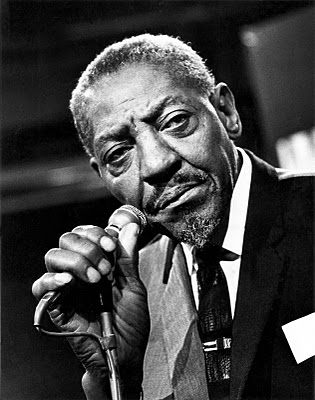
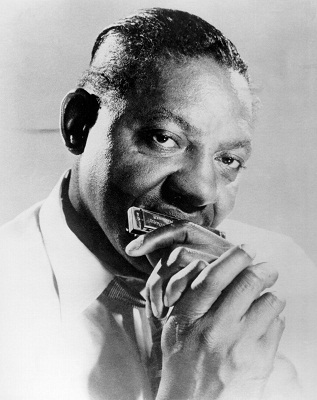
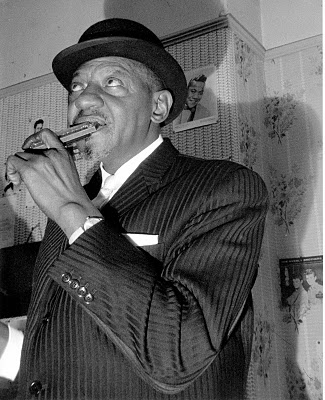
Willie "Sonny Boy" Williamson (possibly December 5, 1912 – May 25, 1965) was an American blues harmonica player, singer and songwriter, from Mississippi. He is acknowledged as one of the most charismatic and influential blues musicians, with considerable prowess on the harmonica and highly creative songwriting skills. He recorded successfully in the 1950s and 1960s, and had a direct influence on later blues and rock performers. He should not be confused with another leading blues performer, John Lee "Sonny Boy" Williamson, who died in 1948.
Born as Alex Miller (pronounced "Aleck") on the Sara Jones Plantation in Tallahatchie County, Mississippi, his date and year of birth are a matter of uncertainty. He claimed to have been born on December 5, 1899, but Dr. David Evans, professor of music and an ethnomusicologist at the University of Memphis, claims to have found census record evidence that he was born around 1912, being seven on February 2, 1920, the day of the census. His gravestone, set up by record company owner Lillian McMurry twelve years after his death, gives his date of birth as March 11, 1908, but the birth date on that stone is certainly incorrect.
He lived and worked with his sharecropper stepfather, Jim Miller, whose last name he soon adopted, and mother, Millie Ford, until the early 1930s. Beginning in the 1930s, he traveled around Mississippi and Arkansas and encountered Big Joe Williams, Elmore James and Robert Lockwood, Jr., also known as Robert Junior Lockwood, who would play guitar on his later Checker Records sides. He was also associated with Robert Johnson during this period. Miller developed his style and raffish stage persona during these years. Willie Dixon recalled seeing Lockwood and Miller playing for tips in Greenville, Mississippi, in the 1930s. He entertained audiences with novelties such as inserting one end of the harmonica into his mouth and playing with no hands.
In 1941 Miller was hired to play the King Biscuit Time show, advertising the King Biscuit brand of baking flour on radio station KFFA in Helena, Arkansas, with Lockwood.
It was at this point that the radio program's sponsor, Max Moore,
began billing Miller as Sonny Boy Williamson, apparently in an attempt
to capitalize on the fame of the well known Chicago based harmonica
player and singer Sonny Boy Williamson
(birth name John Lee Williamson, died 1948). Although John Lee
Williamson was a major blues star who had already released dozens of
successful and widely influential records under the name "Sonny Boy
Williamson" from 1937 onward, Aleck Miller would later claim to have
been the first to use the name, and some blues scholars believe that
Miller's assertion he was born in 1899 was a ruse to convince audiences
he was old enough to have used the name before John Lee Williamson, who
was born in 1914. Whatever the
methodology, Miller became commonly known as "Sonny Boy Williamson,"
(universally distinguished by blues fans and musicians as "Sonny Boy
Williamson number two" or "Sonny Boy Williamson the second") and Lockwood and the rest of his band were billed as the King Biscuit Boys.
In 1949 he relocated to West Memphis, Arkansas, and lived with his sister and her husband, Howlin' Wolf. (Later, for Checker Records, he did a parody of Howlin' Wolf entitled "Like Wolf.") Sonny Boy started his own KWEM radio show from 1948 to 1950 selling the elixir Hadacol.
Sonny Boy also brought his King Biscuit musician friends to West Memphis, Elmore James, Houston Stackhouse, Arthur "Big Boy" Crudup, Robert Nighthawk and others to perform on KWEM Radio.
In the 1940s Williamson married Mattie Gordon, who remained his wife until his death.
Williamson's first recording session took place in 1951 for Lillian McMurry of Jackson, Mississippi's Trumpet Records, three years after the death of John Lee Williamson, which for the first time allowed some legitimacy to Miller's carefully worded claim to being "the one and only Sonny Boy Williamson". McMurry later erected Williamson's headstone, near Tutwiler, Mississippi, in 1977.
When Trumpet went bankrupt in 1955, Sonny Boy's recording contract was yielded to its creditors, who sold it to Chess Records in Chicago, Illinois. Sonny Boy had begun developing a following in Chicago beginning in 1953, when he appeared there as a member of Elmore James's band. It was during his Chess years that he enjoyed his greatest success and acclaim, recording about 70 songs for Chess subsidiary Checker Records from 1955 to 1964. Sonny Boy's first LP record was titled Down and Out Blues and was released by Checker Records in 1959.
One single, "Boppin' With Sonny" b/w "No Nights By Myself" was released with Ace Records in 1955.
In the early 1960s he toured Europe several times during the height of the British blues craze (American Folk Blues Festival), recording with The Yardbirds (album: Sonny Boy Williamson and The Yardbirds) and The Animals, and appearing on several TV broadcasts throughout Europe. During this time Sonny was quoted as saying, " those British boys want to play the blues real bad, and they do". According to the Led Zeppelin biography Hammer of the Gods, while in England Sonny Boy set his hotel room on fire while trying to cook a rabbit in a coffee percolator. The book also maintains that future Led Zeppelin vocalist Robert Plant purloined one of the bluesman's harmonicas at one of these shows as well. Robert Palmer's "Deep Blues" mentions that during this tour he allegedly stabbed a man during a street fight and left the country abruptly.
Sonny Boy took a liking to the European fans, and while there had a
custom made, two - tone suit tailored personally for him, along with a
bowler hat, matching umbrella, and an attaché case for his harmonicas.
He appears credited as "Big Skol" on Roland Kirk's live album Kirk in Copenhagen (1963). One of his final recordings from England, in 1964, featured him singing "I'm Trying To Make London My Home" with Hubert Sumlin
providing the guitar. Due to his many years of relating convoluted,
highly fictionalized accounts of his life to friends and family, upon
his return to the Delta, some expressed disbelief upon hearing of Sonny
Boy's touring across the Atlantic, visiting Europe, seeing the Eiffel
Tower, Big Ben and other landmarks, and recording there.
Upon his return to the U.S., he resumed playing the King Biscuit Time show on KFFA, and performed in the Helena, Arkansas, area. As fellow musicians Houston Stackhouse and Peck Curtis waited at the KFFA studios for Williamson on May 25, 1965, the 12:15 broadcast time was closing in and Sonny Boy was nowhere in sight. Peck left the radio station to locate Williamson, and discovered his body in bed at the rooming house where he had been staying, dead of an apparent heart attack suffered in his sleep the night before.
Williamson is buried on New Africa Rd. just outside Tutwiler, Mississippi, at the site of the former Whitman Chapel cemetery. His headstone was provided by Mrs. Lillian McMurry, owner of Trumpet Records; the death date shown on the stone is incorrect.
Some of his better known songs include "Don't Start Me To Talkin'"
(his only major hit, it reached the #3 position on the national
Billboard R&B charts in 1955), "Fattenin' Frogs for Snakes", "Keep
It
To Yourself", "Your Funeral and My Trial", "Bye Bye Bird", "Nine Below
Zero", "Help Me", "Checkin' Up on My Baby", and the infamous "Little Village", with dialogue 'unsuitable for airplay' with Leonard Chess. His song "Eyesight to the Blind" was performed by The Who as a key song in their rock opera Tommy (the only song in that opus not written by a band member) and it was later covered on the Aerosmith album Honkin' on Bobo. His "One Way Out", reworked from Elmore James and recorded twice in the early 1960s, became popularized by The Allman Brothers Band in the early 1970s. In interviews in The Last Waltz, roots - rockers The Band
recount jamming with Miller prior to their initial fame as Bob Dylan's
electric backing band, and making never realized plans to become his
backing band. Many of his most famous recordings appeared on The Essential Sonny Boy Williamson and His Best.
While tall tales, unlikely fables and outright lies make up much of what Sonny Boy Williamson II had to say about his own life, his most important contributions have been documented well through countless recordings on myriad labels. His output of recordings, both issued and unissued, for Lillian McMurray's Trumpet label, can be found on Arhoolie, Alligator, Purple Pyramid, Collectables, plus a handful of other domestic and import imprints, while his years as a resident of the Chess / Checker house appear on various compilations on MCA / Chess. His European recordings reside on Alligator, Analogue Productions, Storyville, and others.
Sonny Boy Williamson II has had an influence on modern day blues and blues rock artists, as is shown by the number of his songs that are still covered.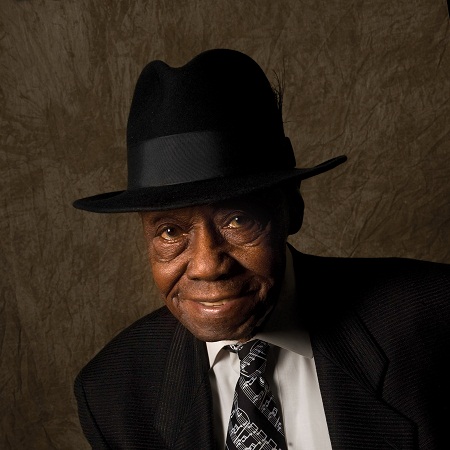
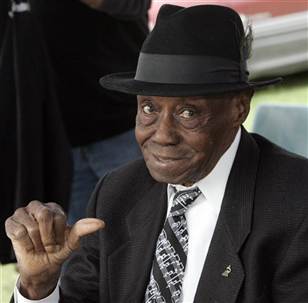
Joseph William Perkins (July 7, 1913 – March 21, 2011), known by the stage name Pinetop Perkins, was an American blues musician, specializing in piano music. He played with some of the most influential blues and rock and roll performers in American history, and received numerous honors during his lifetime including the Grammy Lifetime Achievement Award, and induction into the Blues Hall of Fame.
Perkins was born in Belzoni, Mississippi, United States. He began his career as a guitarist, but then injured the tendons in his left arm in a fight with a choir girl in Helena, Arkansas. Unable to play guitar, Perkins switched to the piano, and also switched from Robert Nighthawk's KFFA radio program to Sonny Boy Williamson's King Biscuit Time. He continued working with Nighthawk, however, accompanying him on 1950's "Jackson Town Gal".
In the 1950s, Perkins joined Earl Hooker and began touring, stopping to record "Pinetop's Boogie Woogie" (written by Pinetop Smith) at Sam Phillips' studio in Memphis, Tennessee. ("They used to call me Pinetop," he recalled, "because I played that song.") However, Perkins was only 15 years old in 1928, when Smith originally recorded "Pinetop's Boogie Woogie".
Perkins then relocated to Illinois and left the music business until Hooker convinced him to record again in 1968. When Otis Spann left the Muddy Waters band in 1969, Perkins was chosen to replace him. He stayed for more than a decade, then left with several other musicians to form The Legendary Blues Band with Willie "Big Eyes" Smith, recording through the late 1970s, 1980s and early 1990s.
Perkins played a brief musical cameo on the street outside Aretha's Soul Food Cafe in the 1980 movie The Blues Brothers, having an argument with John Lee Hooker over who wrote "Boom Boom." He also appeared in the 1987 movie Angel Heart as a member of guitarist Toots Sweet's band.
Although he appeared as a sideman on countless recordings, Perkins never had an album devoted solely to his artistry, until the release of After Hours on Blind Pig Records in 1988. The tour in support of the album also featured Jimmy Rogers and Hubert Sumlin.
His robust piano is fairly presented in On Top (1992), an easy going recital of blues standards with his old Waters' associate, Jerry Portnoy on harmonica. In 1998 Perkins released the album Legends featuring guitarist Hubert Sumlin.
Perkins was driving his automobile in 2004 in La Porte, Indiana, when he was hit by a train. The car was wrecked, but the 91 year old driver was not seriously hurt. Until his death, Perkins lived in Austin, Texas. He usually performed a couple of nights a week at Nuno's on Sixth Street. In 2005, Perkins received the Grammy Lifetime Achievement Award.
In 2008, Perkins received a Grammy Award for Best Traditional Blues Album for Last of the Great Mississippi Delta Bluesmen: Live In Dallas together with Henry James Townsend, Robert Lockwood, Jr. and David Honeyboy Edwards. He was also nominated in the same category for his solo album, Pinetop Perkins on the 88's: Live in Chicago.
The song "Hey Mr. Pinetop Perkins", performed by Perkins and Angela Strehli, played on the common misconception that Perkins wrote "Pinetop's Boogie Woogie":
-
- Hey Mr. Pinetop Perkins
- I got a question for you
- How'd you write that first boogie woogie
- The one they named after you
At the age of 97, he won a Grammy Award for Best Traditional Blues Album for Joined at the Hip, an album he recorded with Willie "Big Eyes" Smith. Perkins thus became the oldest ever Grammy winner, edging out comedian George Burns who had won in the spoken word category 21 years earlier (he had tied with Burns, at the age of 90, in 2004). A little more than a month later, Perkins died on 21 March 2011 at his home in Austin, Texas.
At the time of his death, the musician had more than 20 performances
booked for 2011. Shortly before that, while discussing his late career
resurgence with an interviewer, he conceded, "I can't play piano like I
used to either. I used to have bass rolling like thunder. I can't do
that no more. But I ask the Lord, please forgive me for the stuff I done
trying to make a nickel." Along with David "Honeyboy" Edwards, he was one of the last two original Mississippi Delta blues musicians, and also to have a personal knowledge of, and friendship with, Robert Johnson.
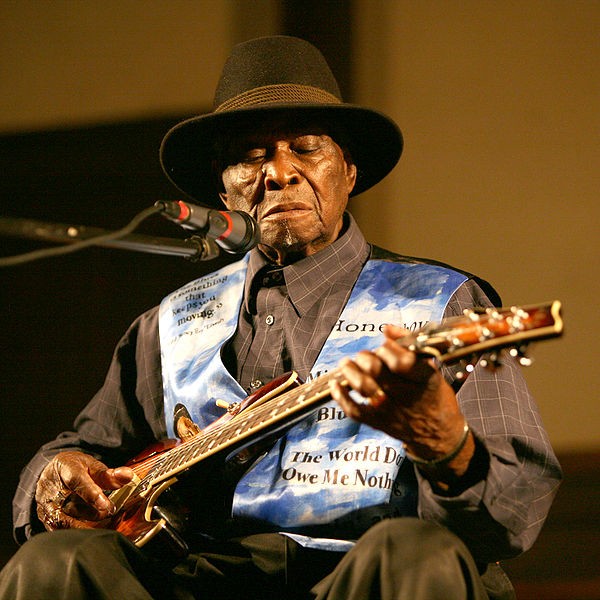
David "Honeyboy" Edwards (June 28, 1915 – August 29, 2011) was a Delta blues guitarist and singer from the American South. Edwards was the last Delta bluesman before his 2011 death.
Edwards was born in Shaw, Mississippi. Edwards was 14 years old when he left home to travel with bluesman Big Joe Williams, beginning the life as an itinerant musician which he led throughout the 1930s and 1940s. He performed with and was a friend of blues musician Robert Johnson. Honeyboy was present on the night Johnson drank poisoned whiskey which killed him, and his story has become the definitive version of Johnson's demise. Edwards knew and played with many of the leading bluesmen in the Mississippi Delta: Charley Patton, Tommy Johnson, and Johnny Shines.
He described the itinerant bluesman's life:
| “ | On Saturday, somebody like me or Robert Johnson would go into one of these little towns, play for nickels and dimes. And sometimes, you know, you could be playin' and have such a big crowd that it would block the whole street. Then the police would come around, and then I'd go to another town and where I could play at. But most of the time, they would let you play. Then sometimes the man who owned a country store would give us something like a couple of dollars to play on a Saturday afternoon. We could hitchhike, transfer from truck to truck, or if we couldn't catch one of them, we'd go to the train yard, 'cause the railroad was all through that part of the country then... we might hop a freight, go to St. Louis or Chicago. Or we might hear about where a job was paying off - a highway crew, a railroad job, a levee camp there along the river, or some place in the country where a lot of people were workin' on a farm. You could go there and play and everybody would hand you some money. I didn't have a special place then. Anywhere was home. Where I do good, I stay. When it gets bad and dull, I'm gone. | ” |
Folklorist Alan Lomax recorded Edwards in Clarksdale, Mississippi, in 1942 for the Library of Congress. Edwards recorded 15 album sides of music. The songs included "Wind Howlin' Blues" and "The Army Blues". He did not record again commercially until 1951, when he recorded "Who May Be Your Regular Be" for Arc Records under the name of Mr Honey. Edwards claims to have written several well known blues songs including "Long Tall Woman Blues" and "Just Like Jesse James". His discography for the 1950s and 1960s amounts to nine songs from seven sessions. From 1974 to 1977, he recorded material for a full length LP, I've Been Around, released in 1978 on the independent Trix Records label by producer / ethnomusicologist Peter B. Lowry.
Edwards authored the book, The World Don't Owe Me Nothin', published in 1997 by Chicago Review Press. The book recounts his life from childhood, his journeys through the South and his arrival in Chicago in the early 1950s. A companion CD by the same title was released by Earwig Music shortly afterwards. His long association with Earwig Music and Michael Frank spawned many late career albums on a variety of independent labels from the 1980s on. He has also recorded at a church - turned - studio in Salina, Kansas, and released albums on the APO record label. Edwards continued the rambling life he describes in his autobiography as he still toured the world well into his 90s.
On July 17, 2011, his manager Michael Frank announced that Edwards would be retiring due to ongoing health issues.
On August 29, 2011, Edwards died at his home, of congestive heart failure, at around 3 a.m. According to events listings on the Metromix Chicago website, Edwards had been scheduled to perform at noon that day, at the Jay Pritzker Pavilion in Chicago's Millennium Park.
In the 1991 documentary The Search for Robert Johnson, Edwards recounts stories about Johnson, including his murder.
The story of Edwards' life is told in the 2010 award winning film "Honeyboy and the History of the Blues" from Free Range Pictures, directed by Scott Taradash. The film features stories of Honeyboy's life from picking cotton as a sharecropper to traveling the world sharing his music. Artists who appear in the film include Keith Richards, Robert Cray, Joe Perry, Lucinda Williams, BB King, Big Joe Williams and Ace Atkins.
Edwards appeared in the 2007 film, Walk Hard: The Dewey Cox Story.
- 1996: Inducted into the Blues Hall of Fame
- 1998: Keeping the Blues Alive Award in literature for The World Don't Owe Me Nothing
- 2002: National Endowment for the Arts, National Heritage Fellowship Award
- 2005: Acoustic Blues - Artist of the Year (26th W.C. Handy Blues Awards)
- 2007: Acoustic Artist of the Year (The Blues Music Awards)
- 2008: Grammy Award; Best Traditional Blues Album for Last of the Great Mississippi Delta Bluesmen: Live In Dallas
- 2010: Lifetime Achievement Award, Grammy; Mississippi Governor's Awards For Excellence in the Arts
- 2010: Lifetime Achievement Award, National Guitar Museum
His albums White Windows, The World Don't Owe Me Nothin', Mississippi Delta Blues Man, and a recent album in which he appears with Robert Lockwood, Jr., Henry Townsend and Pinetop Perkins, Last Of The Great Mississippi Delta Bluesmen: Live In Dallas, were all nominated for the W. C. Handy Award. The latter album also won a Grammy Award in 2008.